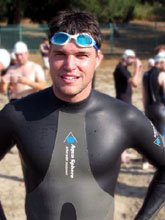There was an article in SLATE Wednesday by pediatrician Sydney Spiesel called "Beware of Diet," which concludes that diets are overwhelmingly not effective in helping people to lose weight and keep it off. At one point Spiesel summarizes the findings of a study by UCLA psychologist, Traci Mann:
"...the experimental subjects were kept on their low-calorie diets for 18 months without other weight-loss interventions... and their weight was measured again a year after the diet ended. A comparison of the dieting subjects with the control group... showed some weight loss a year post-diet, but it was disappointingly small: an average decrease of 3.75 pounds. The other six long-term studies (which... included other interventions besides diet) showed similarly unimpressive results: The average dieting weight loss maintained over extended time (between 2.5 and 10.5 years) was less than 2.5 pounds.
"Mann and her colleagues also examined other studies. In 14 studies that lacked control groups, but followed dieters for at least four years after a prescribed reduced-calorie diet, the average early weight loss after dieting was almost 31 pounds. But by the end of the follow-up period, on average the dieters gained back more than 24 of the pounds they had lost. In 10 studies in which nutritional scientists tracked the weight of people who put themselves on any diet of their choosing, the results were even worse. Of the 10 reports, only one described lasting weight loss, two showed no long-term effect, and the remaining seven studies found that dieting led to weight gain in the long run...
"Mann's analysis casts serious doubt on the value of dieting for weight control. In my pediatric practice, I've become increasingly reluctant to push dieting on children, even very heavy ones... I am coming to believe ever more strongly in the value of pleasurable exercise for weight control and for independent health benefits."
As a pediatrician in an age of skyrocketing childhood obesity rates, Spiesel is on the front lines of a major health crisis. Appallingly, though, his medical training left him woefully unprepared to tackle the problem. He writes that he was essentially taught to counsel overweight patients to eat less, and that if at that point, they failed to lose weight, it was not due to any shortcoming in that rather facile advice, but instead, to a moral failing on the part of the patient. The fact that 24/7 dieting takes almost Herculean vigilance and willpower has in a sense absolved the medical community from addressing obesity on a deeper level: it has meant that doctors could make their standard recommendation and then blame the patient when their advice failed. Mann's rigorous study, however, does an excellent job debunking the "eat less" myth, and, well, at the very least, we can praise Jesus for that.
So "eat less" doesn't work? Stop the press.
I may just be a lowly fitness guy, but I'm here to tell you: thou needs no ghost come from the grave to tell us this. It's been in just about every fitness book and magazine and matchbook cover I've read for the last 25 years.
I have something of a love-hate fascination with the freakshow that is professional bodybuilding. I think what they do is both fascinating and a little weird. Still, maybe I need to cut them a break and conclude, as Arnold Schwarzenegger did in broken English, circa 1975, that "it's not any stranger than getting in a car and trying to drive a quarter mile five seconds. That is to me strange."
However one feels about bodybuilders, though, one unquestionably valuable service they provide is to investigate questions about the limits of human physiology, among them, "how lean can a human being get while holding onto as much muscle mass as possible?" Using their own bodies as science labs (often chemistry labs as well), bodybuilders have been trying to answer that question since at least the '50s. Over time, many of the common practices of bodybuilders and other athletes have been systematically tested and refined over the years by people with white coats and letters after their names, and the practices that work have eventually made their way into common fitness lore read by me, you, and thousands of individuals who wish to lose weight.
Take, for instance, the standard bodybuilding operating procedure on losing fat while maintaining muscle. Generally the suggestion is that you should eat six times a day, reduce your consumption of carbohydrates, particularly in refined form, and consume ample amounts of protein. Vegetables and fruits are essential. Exercise should largely take the form of strength training, as excessive aerobic exercise can lead to a loss of muscle mass.
For Pete's sake, does this sound familiar to anyone? It's only the Cliffs Notes form of what you see in pretty much every bestselling diet and exercise book from the last five years.
Now I'm not saying we should turn to the bodybuilding community, with their two-hour bicep workouts, their extreme diets, and their creative use of pharmaceuticals for balanced and practical advice on eating and exercise. But in a sense those guys are the theoretical physicists, out there on the fringes, whose crazy methods often seem to find their way, in a less extreme form, into common, John Q. gym-goer usage. And I for one feel a little bit bad for all those big guys, schlepping their 200-pound dumbbells to the bench for their seventh set of flyes, while some pencil-neck in a lab coat is winning the Nobel Prize for their decades-old methodology.
Partly due the the efforts of the big guys, fitness geeks have long known that arbitrarily eating less is a poor fix for weight loss, mostly because if you're not simultaneously doing something to maintain your muscle mass, any weight you lose will be about half fat and half muscle. Muscle tissue is metabolically expensive: it burns calories just sitting there on your skeleton making you look pretty, and of course it burns even more calories helping you move around. So when the body senses that food is scarce -- i.e., when you "eat less" -- it will quite naturally dump some of the tissue that is costing the most energy (muscle mass) and hold onto the tissue that costs less to have around (fat). The trick is to convince the body to hold onto the muscle mass, because the more muscle you have, the more calories you burn both at rest and at play, so anyone gunning to lose weight should make building muscle a top priority.
Strength training is the fastest, most effective way to build muscle mass that we know about. It's why if a client wants to lose fat, the first thing I do is get them lifting some challenging weights. Only then do we talk about diet, "cardio", and taking those famous "brisk walks" that are supposed to do everyone so much good.
The piece of the puzzle that Spiesel and Mann seem to be missing is that dieting alone -- without an intense strength training regimen to accompany it -- causes a loss of muscle mass. So the majority of the subjects of Mann's trial were losing at least as much muscle as they were fat. Since muscle mass is our most effective tool in the fight against fat, it makes perfect sense to me, and to any fitness pro worth his clipboard, that those subjects would rapidly regain any weight lost at the conclusion of their period of dieting. That many of them would gain even more weight on top of that also makes sense, since, thanks to their diets, they now had less muscle mass on their frames with which to burn the fat.
Lou Schuler and Alwyn Cosgrove draw an analogy in NEW RULES OF LIFTING: if you don't weight train while trying to lose fat, you're like a CEO who fires his best workers in the midst of a financial crisis. Maybe you'll save some money in the short run, but you're setting yourself up for financial ruin in the shockingly near future.
For what it's worth, I applaud Spiesel's decision to recommend primarily exercise, and not dieting, to patients who wish to lose weight. Without suggesting that strength training is the cure-all for obesity, or that all people great and small are perfect candidates for a heavy iron-pumping regimen, I do think that many of Spiesel's patients could do even better if among his recommendations was, specifically, a healthy dose of strength training. Not only would they gain muscle mass, lose fat, and feel better about themselves, they would avoid the joint damage, pain, and muscle loss that can occur when heavy, sedentary people suddenly try to do a lot of traditional, weight-bearing cardiovascular exercise like running, which in this particular context could do more harm than good. Added to an exercise routine like that, a smart diet can only help: fat loss will increase, and muscles will have the nutritional support they need to continue to strengthen and grow.
It's not easy, of course. Having worked with obese clients in the past, I'm aware that every step can feel like a struggle. But if Mann's study blessedly helps put the final nail in the coffin of "eat less," perhaps Spiesel's work will help usher in a new era of "lift more."
For a Lou-Schuleristic take on the Spiesel piece, click here.
Thursday, July 05, 2007
Long Live Lifting
Subscribe to:
Post Comments (Atom)




2 comments:
I've been on a weight-loss rollercoaster for 10 years, and my recent success started with regular cardio. Limiting junk food has also been a big part of it, but I don't actually worry about eating LESS, per se, just eating better. I've gradually started doing more strength training the past few months, and now that I'm close to my goal weight I'm seeing the increasing importance of working to retain lean mass, as least based on my handheld and footpad body fat monitors. If my weight drops but my body fat doesn't, then I wonder if I'm even losing the right kind of weight! I'm becoming more and more convinced that I need to focus on resistance training and that I can actually dial back the hour-long cardio sessions that were becoming the norm.
I'm really enjoying your blog lately, thanks for all the great writing and accessible expertise you share here!
Thanks Jonathan! Congratulations on all your success. Over-reliance on the scale, without monitoring lean body mass and fat percentage, is another whole issue that warrants discussion--and a possible shortcoming in some of the studies above, which seem to monitor primarily scale weight. Sounds like you're doing it right, keeping an eye on all the variables. Keep it up, and thanks for visiting!
Post a Comment